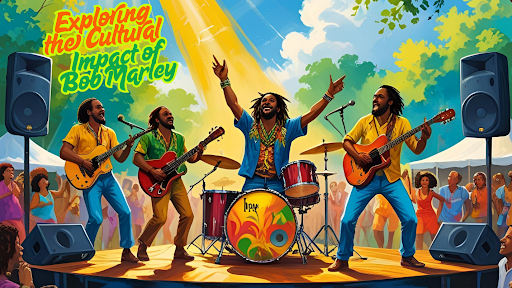Reggae’s Roots: Exploring the Cultural Impact of Bob Marley
Reggae’s Roots: Exploring the Cultural Impact of Bob Marley
Bob Marley is more than just a legendary musician; he is a global icon whose influence transcends music and touches on culture, spirituality, politics, and social justice. To understand the roots of reggae and its profound cultural impact, it is essential to explore the life, music, and legacy of Bob Marley, who played a pivotal role in popularizing reggae worldwide. This article delves into Marley’s journey, the significance of reggae music, and how his work continues to inspire generations.
Early Life and Jamaican Roots
Robert Nesta Marley was born on February 6, 1945, in the small rural village of Nine Mile, Saint Ann Parish, Jamaica. His mixed heritage—his mother, Cedella Booker, was a black Jamaican, and his father, Norval Marley, was a white Jamaican of English descent—placed Bob in a unique position within Jamaican society, a country marked by its colonial past and complex racial dynamics.
Growing up in the impoverished neighborhoods of Kingston, Marley was exposed to the struggles of everyday Jamaicans. These early experiences deeply influenced his worldview and later his music. Jamaica in the 1950s and 60s was a country grappling with the aftermath of colonialism, economic hardship, and social inequality, all of which became central themes in Marley’s songwriting.
The Birth of Reggae and Marley’s Musical Journey
Reggae music emerged in the late 1960s as a distinct genre, evolving from earlier Jamaican styles like ska and rocksteady. It was characterized by its offbeat rhythms, soulful melodies, and socially conscious lyrics. Bob Marley, along with his band The Wailers, was at the forefront of this musical revolution.
Initially, Marley and The Wailers experimented with ska and rocksteady, but it was reggae’s slower tempo and deeper message that resonated with them. Their music spoke to the realities of Jamaican life—the poverty, the political unrest, and the hope for change.
Marley’s breakthrough came in the early 1970s with albums like Catch a Fire and Burnin’, which included powerful tracks such as “Get Up, Stand Up” and “I Shot the Sheriff.” These songs combined infectious rhythms with calls for social justice and resistance against oppression, capturing the spirit of a people yearning for freedom and dignity.
Rastafarianism: Spiritual Roots of Marley’s Music
A critical element of Bob Marley’s identity and music was his embrace of Rastafarianism, a religious and cultural movement that originated in Jamaica in the 1930s. Rastafarian beliefs center on African pride, resistance to oppression (referred to as “Babylon”), and spiritual redemption.
Marley’s faith profoundly influenced his lyrics and public persona. Songs like “Jah Live,” “Exodus,” and “One Love” reflect Rastafarian themes of unity, peace, and divine justice. His music was not just entertainment; it was a spiritual message and a call to awareness.
Rastafarianism also emphasized the importance of African roots and heritage, which resonated with many Jamaicans and people of African descent worldwide. Marley’s promotion of Rastafarian culture helped bring global attention to this spiritual movement and its messages of empowerment.
Marley’s Role as a Social and Political Voice
Bob Marley’s music became a powerful tool for social change. In a country marked by political violence and social division, Marley’s concerts and songs promoted unity and peace. His 1978 “One Love Peace Concert” famously brought together rival political leaders on stage in a symbolic gesture of reconciliation.
Songs like “War,” which is adapted from a speech by Ethiopian Emperor Haile Selassie, directly address issues of racial inequality and human rights. Marley’s willingness to speak truth to power made him a beacon for oppressed peoples around the world.
His music also addressed themes of poverty, injustice, and resilience. “No Woman, No Cry” is a poignant tribute to the struggles of Jamaican ghetto life, while “Redemption Song” calls for mental and spiritual liberation.
Globalizing Reggae: Marley’s International Impact
Bob Marley was instrumental in taking reggae from the streets of Kingston to the global stage. His 1977 album Exodus was pivotal, blending reggae rhythms with universal themes of freedom and hope. The album’s success in the UK and the US introduced reggae to new audiences and cemented Marley’s status as a global icon.
Marley’s music crossed cultural and racial boundaries, resonating with people facing oppression, discrimination, and hardship worldwide. His message of love, unity, and resistance found a home in the civil rights movements, anti-apartheid struggles, and other social justice causes.
The posthumous release of Legend in 1984, a greatest hits compilation, became one of the best-selling reggae albums of all time, ensuring Marley’s music would continue to inspire generations.
Cultural Legacy and Influence
Bob Marley’s cultural impact extends beyond music. He became a symbol of Jamaican identity and pride, showcasing the island’s rich cultural heritage to the world. His image, music, and message have been embraced in fashion, art, and popular culture.
Reggae music itself has influenced countless genres, including hip-hop, punk, and pop. Artists worldwide cite Marley as an inspiration, and his songs continue to be covered and sampled.
In Jamaica, Marley’s legacy is celebrated annually during Reggae Month in February, and his birthplace in Nine Mile is a popular pilgrimage site for fans.
Marley’s Enduring Relevance Today
More than four decades after his death in 1981, Bob Marley’s music remains profoundly relevant. His calls for social justice, peace, and unity resonate in today’s global struggles against inequality and injustice.
Songs like “Get Up, Stand Up” and “Buffalo Soldier” are anthems for activism, while “One Love” continues to inspire hope and togetherness.
Marley’s promotion of Rastafarian culture has also helped spread awareness of African spirituality and heritage, influencing global perceptions of identity and resistance.
From Reggae to Online Gaming: Experience Filipino Culture on GameZone
Just as reggae music connects people through culture and shared experience, online gaming platforms like GameZone bring communities together through popular Filipino card games. GameZone is a PAGCOR-licensed platform that offers a wide variety of games including the beloved Tongits, Super Ace, and Color Game.
Why Play Tongits and More on GameZone?
- Diverse Game Selection: Beyond Tongits, GameZone features exciting games like Super Ace and Color Game, catering to different player preferences.
- Safe and Licensed: As a PAGCOR-licensed platform, GameZone ensures fair play and secure transactions.
- Social Interaction: Players can chat and engage with others, replicating the fun and camaraderie of traditional Filipino game nights.
- Accessibility: Play anytime, anywhere on desktop or mobile devices.
Join the Fun: Connect Culture and Community
Whether you’re inspired by Bob Marley’s timeless reggae or looking to enjoy classic Filipino card games like Tongits on GameZone, both experiences celebrate culture, community, and connection. Marley’s music reminds us of the power of unity and resilience, while GameZone offers a modern platform to socialize, compete, and have fun.

